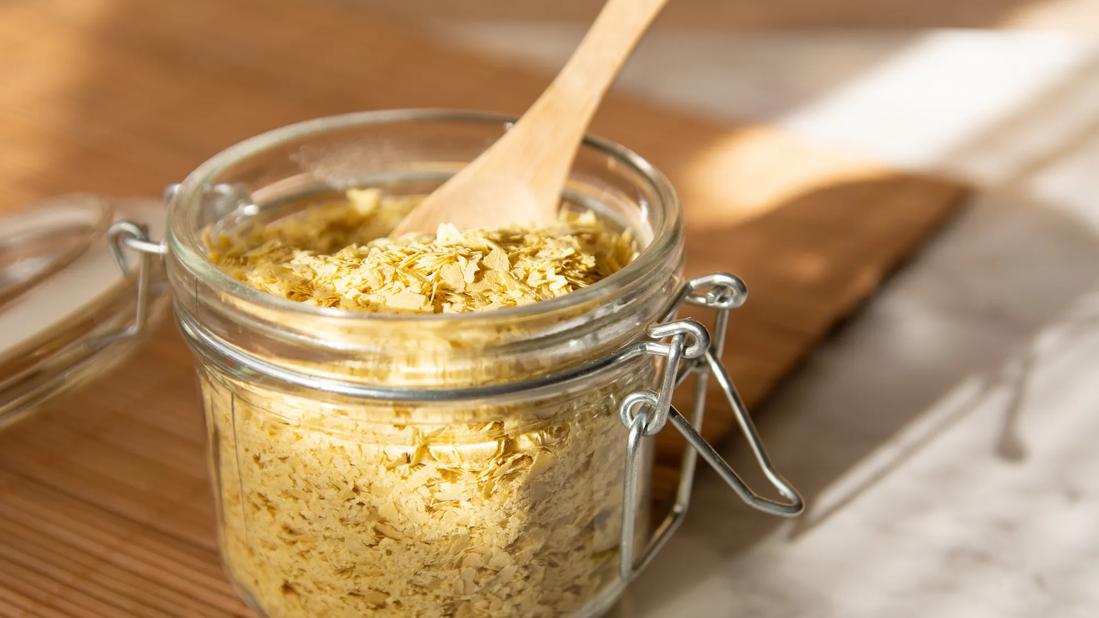4 Ways Nutritional Yeast Is Good for You
Nondairy, cheesy-tasting nutritional yeast (aka ‘nooch’) is a rich source of vitamin B12 and other good-for-you nutrients

If the idea of eating yeast makes you scrunch up your nose, chances are, you haven’t tried nutritional yeast. Fans of this savory, edible yeast lovingly call it “nooch.”
“Nutritional yeast has protein, B vitamins and other nutrients,” says registered dietitian Julia Zumpano, RD, LD. “It can add a rich flavor, known as umami, to dishes.”
Zumpano shares the benefits of nutritional yeast, including ways to use it to add flavor to your food.
What is nutritional yeast?
Nutritional yeast is part of the Saccharomyces cerevisiae fungus family. It’s an edible yeast that forms when molasses (a natural sugar) and oxygen mix and ferment. The same process makes brewer’s yeast, used in alcohol and baker’s yeast, which helps bread rise.
But nutritional yeast is different because it goes through a heating process that deactivates its ability to ferment.
Types of nutritional yeast
You can buy inactive, dehydrated nutritional yeast in flakes, granules and powders. You’re most likely to see fortified nutritional yeast sold in stores and online. This type has naturally occurring vitamins and minerals, as well as added nutrients.
Nonfortified nutritional yeast is still good for you, but it doesn’t contain the added nutrients.
Nutritional yeast benefits and nutrition
A 2-tablespoon serving of nutritional yeast is fat-free and has approximately:
- 40 calories
- 3 grams of carbohydrates
- 2 grams of fiber
- 5 grams of protein
- 20 milligrams of sodium
The same amount of fortified nutritional yeast also provides these B vitamins:
- 212 micrograms of vitamin B12 (630% of your daily value or DV)
- 6 milligrams of thiamine (520% DV)
- 6 milligrams of riboflavin (480% DV)
- 7 milligrams of vitamin B6 (420% DV)
- 35 milligrams of niacin (220% DV)
- 212 micrograms of folate (90% DV)
Is nutritional yeast good for you?
Yes. For such a little fungus, the nutritional yeast benefits are plentiful.
1. Builds strong bones and muscles
Nutritional yeast is a great source of plant-based protein, especially for those who follow plant-based diets. Two tablespoons provide almost the same amount of protein as one egg. It’s also a complete protein (similar to animal protein), containing all nine essential amino acids your body can’t make.
Your body needs protein to build and maintain healthy bones, muscles and skin. High-protein foods can also promote a healthy weight.
“Protein takes longer to digest, so you feel full longer,” notes Zumpano.
Protein is a macronutrient that also:
- Aids digestion
- Boosts energy
- Fights hunger pangs
- Makes hormones
2. Gives you energy
Nutritional yeast is one of the few plant sources of vitamin B12. One tablespoon of fortified nutritional yeast has more than 300% of the recommended daily amount.
That’s good news for people who follow a vegan meal plan or can’t have dairy products, as they’re at risk of vitamin B12 deficiency. This vitamin helps make red blood cells, supports brain health and helps prevent age-related macular degeneration.
Nutritional yeast is rich in other B vitamins, too. These micronutrients change carbohydrates into fuel, helping to energize you. Because your body can’t store these water-soluble vitamins, you must get them from foods each day.
A tablespoon of fortified nutritional yeast provides a significant amount of:
- Folate (vitamin B9) for healthy cell growth, especially during pregnancy
- Niacin (vitamin B3) for lower cholesterol and healthy skin
- Pyridoxine (vitamin B6) for your heart, brain and mood
- Riboflavin (vitamin B2) for better vision and blood
- Thiamine (vitamin B1) for a healthy nervous system
3. Protects your heart
Nutritional yeast has special dietary fibers called alpha-mannan and beta-glucan. Research suggests that beta-glucan can lower blood sugar and your risk of diabetes. It also lowers cholesterol levels and your risk of heart disease.
The same research found that beta-glucan may give your immune system a boost and have antitumor effects that protect against cancer.
Beta-glucan is a prebiotic, too. Healthy bacteria in your gut feed on prebiotics, helping to minimize inflammation. Foods with beta-glucan may lower your risk of colon cancer. Fiber is also important for digestion and can make it easier to have bowel movements without constipation.
4. Lowers disease risk
Nutritional yeast has plant nutrients called polyphenols that have antioxidant properties. Beta-glucan fiber and zinc in nutritional yeast also have antioxidant effects. “Antioxidants protect cells from damage caused by free radicals,” says Zumpano.
Studies suggest that foods with antioxidants can reduce the risk of chronic diseases, including cancer, heart disease, Alzheimer’s disease and diabetes.
Who shouldn’t eat nutritional yeast?
Although rare, some people have a food intolerance to yeast. Nutritional yeast also has an amino acid called tyramine that may interact with medications to treat depression and diabetes. Additionally, it could trigger headaches and migraines.
Nutritional yeast can cause inflammation that worsens conditions, such as:
- Glaucoma
- High blood pressure
- Inflammatory bowel disease (IBD), including Crohn’s disease and ulcerative colitis
If you have any of these conditions or take medications, talk to a healthcare provider about whether you should try to avoid nutritional yeast.
Ways to use nutritional yeast
“Nutritional yeast is a great option if you don’t eat dairy products or you want a cheesy flavor with fewer calories and fat,” says Zumpano. “It has a robust flavor, so you only need one or two tablespoons.”
You can use nutritional yeast in a variety of ways, such as:
- Make vegan macaroni and cheese.
- Make a cheese sauce topping for broccoli, baked potatoes and other veggies.
- Scramble into eggs or tofu (or try this vegan egg-free tofu dish).
- Sprinkle on top of popcorn, pasta, pizza, rice dishes and salads.